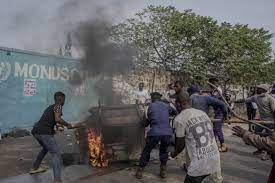DR Congo, UN To Probe Protest Against MONUSCO
The government deployed police and soldiers on Wednesday, July 27, to towns in the eastern part of the country as the demonstrations entered the third day.

The government of the Democratic Republic of Congo says it is establishing a joint commission with the United Nations to establish responsibility for the demonstrations against the United Nations Organisation Stabilisation Mission in DR Congo (MONUSCO) that have resulted in the deaths of 17 persons.
The government deployed police and soldiers on Wednesday, July 27, to towns in the eastern part of the country as the demonstrations entered the third day.
The protesters accused the MONUSCO forces of being ineffective against the over 100 local and foreign armed groups responsible for the chaos in the eastern provinces of North Kivu, South Kivu and Ituri.
The first demonstration was by a group of 50 women who last Friday peacefully marched to Goma, where they could not succeed in delivering a memorandum to the local office of the UN mission, which was closed.
In Goma, the chief town of North Kivu province, youths took over from the women on Monday, July 25, and forced open the doors of the UN mission and its logistics base, looting and destroying everything on their path.
The demonstrations continued on Tuesday, July 26, in other provincial towns, including Beni, Butembo and Nyamilima.
According to official sources, 17 persons were killed, including three members of the MONUSCO mission and 60 others wounded.
The demonstrators were responding to a call by political associations, notably the citizen movement, Fight For Change, LUCHA, the youths of the Union pour la Democratie et le Progres Social (UDPS), which is the party in power right now, as well as a call by the Senate President, Modeste Bahati, who had ten days earlier said MONUSCO should “park its bags and leave after 22 years of presence in DR Congo”.
France condemned the attacks against MONUSCO, and the violence gripped the eastern DR Congo.
“We call for a return to calm and for those responsible for the attacks to be prosecuted and for investigations to be carried out to determine the causes of death,” Quay d’Orsay, a spokesperson of the French Foreign Ministry, said.
In a statement, the DR Congo Episcopal Conference “firmly condemned all violence that took place during the demonstrations”, adding on the other hand that it “understands the anger of compatriots who take part in these demonstrations”.
The conference estimated that the Congolese government and MONUSCO had shown their limits in their mission to secure the populace exposed to attacks by armed groups in DR Congo.
“It is possible that the demonstrators against MONUSCO were manipulated but what is clear is that the UN Mission has lost a lot of its popularity,” said Jason Stearns, chief of the Study Group on Congo attached to the University of New York.
Stearns added that opinions favourable to maintaining the MONUSCO presence in DR Congo have dropped from 55.1 per cent in 2016 to 44.7 per cent.
“In 2016, 63 per cent of people thought that the UN Mission was doing a good job of protecting the civilians today, only 23.6 per cent think so.”
MONUSCO, the world’s most significant and costly UN Mission, has been present in DR Congo since 1999 and has more than 14,000 soldiers of peace with a budget of one billion US dollars.
“Our most ardent wish is to see the eastern DR Congo stabilised”, said Khassim Diagne, assistant chief of MONUSCO, on Tuesday, July 26, during a joint press conference with the Congolese Minister of Communication, Patrick Muyaya.
Support Our Journalism
There are millions of ordinary people affected by conflict in Africa whose stories are missing in the mainstream media. HumAngle is determined to tell those challenging and under-reported stories, hoping that the people impacted by these conflicts will find the safety and security they deserve.
To ensure that we continue to provide public service coverage, we have a small favour to ask you. We want you to be part of our journalistic endeavour by contributing a token to us.
Your donation will further promote a robust, free, and independent media.
Donate HereStay Closer To The Stories That Matter




